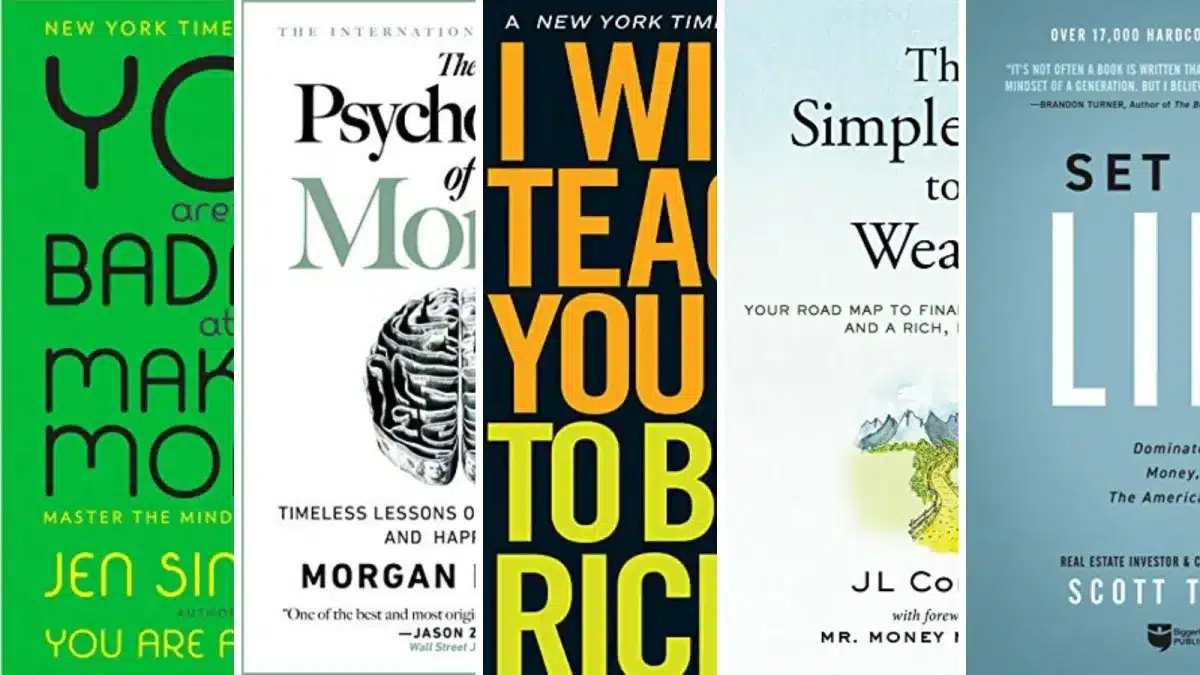Learning about finances can transform your life. The right finance book teaches you to manage money, grow wealth, and secure your future. These books will guide you, whether you’re a beginner or looking to improve your knowledge. Let’s explore the top 10 financial education books and discover how they can empower you.
Top 10 Best Financial Education Books
- Rich Dad Poor Dad by Robert T. Kiyosaki
- The Total Money Makeover by Dave Ramsey
- Think and Grow Rich by Napoleon Hill
- Your Money or Your Life by Vicki Robin and Joe Dominguez
- The Millionaire Next Door by Thomas J. Stanley and William D. Danko
- I Will Teach You to Be Rich by Ramit Sethi
- The Intelligent Investor by Benjamin Graham
- The Psychology of Money by Morgan Housel
- Financial Freedom by Grant Sabatier
- Broke Millennial by Erin Lowry
Rich Dad Poor Dad by Robert T. Kiyosaki
This groundbreaking book is a personal finance classic, praised for its relatable storytelling and practical lessons. Kiyosaki contrasts the financial views of his “Rich Dad” and his “Poor Dad.” “Rich Dad” was a friend’s father, a savvy entrepreneur, while “Poor Dad” had a steady government job but struggled financially. The book teaches key lessons, including the difference between assets and liabilities, the need for financial literacy, and the importance of taking calculated risks. While it focuses on building wealth through real estate, entrepreneurship, and money flow, it also serves as a guide for developing self-discipline, much like the Best Books on How to Study, which encourage readers to adopt new perspectives and habits for success.
The Total Money Makeover by Dave Ramsey
Dave Ramsey’s, no-nonsense, step-by-step guide has helped millions. It has helped them to eliminate debt and control their finances. Ramsey advocates his famous “Baby Steps” program. It starts with saving a $1,000 emergency fund. Then, use the “debt snowball” method to pay off debts from smallest to largest. He also encourages readers to live on a strict budget, invest 15% of their income, and save for retirement. Ramsey’s methods are practical and simple. His book is a top choice for those in debt, as it is full of motivational success stories.
Think and Grow Rich by Napoleon Hill
This classic, first published in 1937, is based on Napoleon Hill’s interviews with some of the wealthiest people of his era, including Andrew Carnegie, Henry Ford, and Thomas Edison. Hill lists 13 principles for success. They include desire, faith, specialized knowledge, persistence, and organized planning. The book stresses that a focused mind can attract wealth and achieve financial goals. Hill’s teachings go beyond money. They urge readers to build discipline and determination to succeed in all areas of life.
Your Money or Your Life by Vicki Robin and Joe Dominguez
This transformative book helps readers reframe their relationship with money by linking financial choices to life values. Robin and Dominguez urge readers to find their “real hourly wage.” Then, they should check if their spending matches their priorities. The book presents a nine-step program for financial independence. It includes tracking expenses, cutting wasteful spending, and investing wisely. This book, on mindfulness and sustainability, is for those who want financial freedom and a meaningful life.
The Millionaire Next Door by Thomas J. Stanley and William D. Danko
This book challenges stereotypes about wealth. It reveals that many millionaires live modestly, save diligently, and invest wisely. Stanley and Danko found seven traits in self-made millionaires. They are frugal, disciplined, and financially independent. The book uses research and interviews to show how ordinary people achieve great financial success. It dispels myths that wealth comes from high income or flashy lifestyles. It proves that anyone can build long-term wealth by adopting smart habits.
I Will Teach You to Be Rich by Ramit Sethi
Ramit Sethi’s book is a modern personal finance guide for young professionals. The book, in a funny, chatty tone, lays out a six-week program. It covers topics like automating savings, negotiating credit card fees, and choosing low-cost investments. Sethi also emphasizes enjoying life while being financially responsible. He urges readers to spend lavishly on what they love and to cut costs on what they don’t value. The book’s practical advice, paired with Sethi’s witty approach, makes it engaging and easy to follow.
The Intelligent Investor by Benjamin Graham
Dubbed the “Bible of Investing,” this book provides a comprehensive guide to value investing. Benjamin Graham, Warren Buffett’s mentor, teaches readers to evaluate stocks. He warns against speculation and advocates for a margin of safety in investing. He emphasizes the importance of discipline, patience, and long-term thinking. Graham introduces “Mr. Market,” a metaphor for the stock market’s irrationality. It urges investors to stay calm during market ups and downs. The Intelligent Investor is a must-read for serious investors. It’s more technical than some books but worth it.
The Psychology of Money by Morgan Housel
Morgan Housel has a fresh take on personal finance. He explores how emotions and behaviors affect money decisions. Housel, through stories and examples, explains that behavior, not knowledge, drives financial success. He covers the effects of compounding, the dangers of overconfidence, and the need for financial flexibility. This book is notable for its simplicity and relatability. It offers valuable insights for readers at any stage of their financial journey.
Financial Freedom by Grant Sabatier
This inspiring book is based on Grant Sabatier’s journey. He went from broke to financially independent by age 30. Sabatier outlines actionable strategies to maximize income, reduce expenses, and invest effectively. He advocates for multiple income streams and side hustles to build wealth faster. Financial Freedom aims to help millennials escape the 9-to-5 grind. It offers a new take on achieving early retirement and financial independence.
Broke Millennial by Erin Lowry
Erin Lowry’s guide is perfect for young adults. It’s relatable and jargon-free. It helps them navigate personal finance for the first time. The book covers student loans, credit, budgeting, and investing. Lowry’s real-life stories and tips make finance fun and easy to grasp. Broke Millennial helps you control your finances in your 20s and 30s. It covers splitting bills with roommates and negotiating your first salary.
FAQs
Who should read financial education books?
Anyone who wants to manage money better should read these books. They will help grow wealth and achieve financial independence.
How do I choose the best book for my needs?
Identify your goals. If you’re struggling with debt, start with books like The Total Money Makeover. For investing, consider The Intelligent Investor.
Can financial books help me if I’m a beginner?
Yes! Many financial books, like Rich Dad Poor Dad and Broke Millennial, are for beginners. They explain concepts in simple terms.
Are financial education books still relevant today?
Absolutely. While markets evolve, the core principles of financial literacy remain timeless.
Conclusion
Financial education books are powerful tools for transforming your financial future. These books teach basic money management and smart investing. They provide the knowledge and inspiration you need. Start with one that aligns with your goals. Then, take the first step toward financial freedom.

